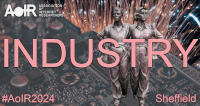AI INDUSTRY EXPECTATIONS AND UNDERPERFORMING IMAGINARIES
DOI:
https://doi.org/10.5210/spir.v2024i0.14086Palabras clave:
imaginary, sociotechnical imaginaries, artificial intelligence, STS, controversyResumen
The panel takes up AoIR’s theme of how industry pre-mediates the future of internet technology and its effects and inquiries into alternatives. Utilising ideas from the study of sociotechnical imaginaries, it aims to locate, map, and critically examine AI imaginaries together with counter-imaginaries that engage with and intervene in those of the AI industry. First, it maps the discursive landscape of Big Tech ‘AI talk’ as a means to study ‘new media concentration’. Which Big Tech AI imaginaries are stabilising? More normatively, do they seek to cement their interdependence both generally but also with respect to the future of internet technology? More specifically, how does the AI industry imagine regulation, sustainability, and the hoped (and feared) AI futures? Recent imaginaries research has emphasised multi-actor, non-linear approaches revolving around the notion of 'public imaginaries'. Along those lines, in the panel we bring together studies of AI imaginaries performed within but also beyond the AI industry. The panel considers the AI industry’s relationships with various actors, such as governments, media outlets, and academia, and the complex interplay that produces imaginaries as well as the issues that come with them. In addressing these questions and interests, the panel also presents various methodological entry points to the study of imaginaries of the AI industry and the larger ecosystem from direct interviews and distant and close readings of (cross-cultural) media coverage to an analysis of online environments such as websites and social media platforms.Descargas
Publicado
2025-01-02
Cómo citar
Stanusch, . N. B., Rogers, R., Baym, N., Liu, C., Shaw, R., Katzenbach, C., … Zeng, J. (2025). AI INDUSTRY EXPECTATIONS AND UNDERPERFORMING IMAGINARIES. AoIR Selected Papers of Internet Research. https://doi.org/10.5210/spir.v2024i0.14086
Número
Sección
Panels

